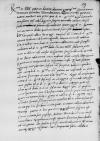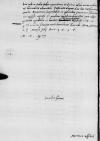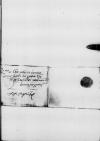Nactus nuntii opportunitatem omittere non potui, quin Dominationem Vestram Reverendissimam hisce litterulis inviserem. Etsi nihil dignum scriptu occurrebat, tamen id ipsum scribere volui et saltem observantiam meam erga Dominationem Vestram Reverendissimam, cui me totum debeo, quantum litteris fieri potest, declarare testari. Dominus ⌊Campensis⌋ adhuc ⌊Romae⌋ agit, transmisi illi litteras Dominationis Vestrae Reverendissimae, verum hactenus nihil mihi respondit, litteras tamen illi redditas scio, intellexi eum brevi in patriam rediturum, unde fortassis crebriores ad Dominationem Vestram Reverendissimam dabit litteras. Dominum ⌊Fabianum⌋ puto nunc in itinere esse versus ⌊Hispanias⌋, scripsit enim mihi ex ⌊urbe⌋ se ex ⌊Bario⌋ rediturum eo circa medium istius mensis, illinc ⌊Genuam⌋ se petiturum traiciendi in ⌊Hispanias⌋ causa. Aestate futura cogar repetere patriam, deficit enim sumptus, haberem equidem animum exemplo Dominationis Vestrae Reverendissimae et domini patrui me conferendi in aulam alicuius principis et inter alias serenissimi ⌊Romanorum regis⌋ ob causas, quas antea Dominationi Vestrae Reverendissimae descripsi, in eo negotio efficiendo tota spes mea posita est in Dominatione Vestra Reverendissima et domino patruo, quos non solum apud dominos aulicos, sed etiam regem ipsum et quosvis principes totius fere Christianitatis plurimum posse non ignoro. Quare me totum subicio gratiae et iudicio Dominationis Vestrae Reverendissimae, ea si voluerit servum suum ex pulvere extollere etc. written over in⌈inetc.etc. written over in⌉, in manu sua est. Nova, quae hinc scribam, nulla sunt, timetur adhuc adventus ⌊Turchae⌋, portus et loca, quae eum aggressurum suspicio est, firmis munita sunt praesidiis. ⌊Andreas Doria⌋ dicitur cum classe circa litus Neapolitanum esse, ⌊Veneti⌋ dicuntur suam habere ad ⌊Corcyram⌋. Non dubito, quin, si ⌊Turcha⌋ advenerit, illi terra marique egregie resistetur. Nam imperator satis validum
 AAWO, AB, D.5, f. 29v
hinc inde in ⌊Italia⌋ habet exercitum et dicitur adhuc novos milites ex ⌊Germania⌋ adventare. Posta ante aliquot dies hac transcurrens, attulit exercitum imperatoris in ⌊Pycardia⌋ strenue et feliciter rem egisse, cepisse Sanctum Paulum oppidum fortissimum cum aliis quattuor oppidulis et tandem Terrovanam written over Berrovanam(?)⌈Berrovanam(?)⌊Terrovanam⌋Terrovanam written over Berrovanam(?)⌉ obsedisse etc. Dominationi Vestrae Reverendissimae me cum servitiis meis humillime commendo.
AAWO, AB, D.5, f. 29v
hinc inde in ⌊Italia⌋ habet exercitum et dicitur adhuc novos milites ex ⌊Germania⌋ adventare. Posta ante aliquot dies hac transcurrens, attulit exercitum imperatoris in ⌊Pycardia⌋ strenue et feliciter rem egisse, cepisse Sanctum Paulum oppidum fortissimum cum aliis quattuor oppidulis et tandem Terrovanam written over Berrovanam(?)⌈Berrovanam(?)⌊Terrovanam⌋Terrovanam written over Berrovanam(?)⌉ obsedisse etc. Dominationi Vestrae Reverendissimae me cum servitiis meis humillime commendo.
 AAWO, AB, D.5, f. 1v unnumbered after f. 29
AAWO, AB, D.5, f. 1v unnumbered after f. 29
 AAWO, AB, D.5, f. 29v
hinc inde in
AAWO, AB, D.5, f. 29v
hinc inde in 

